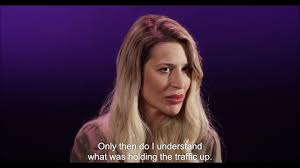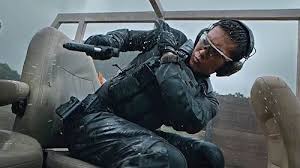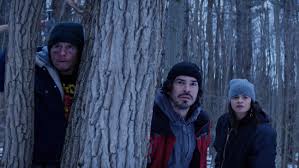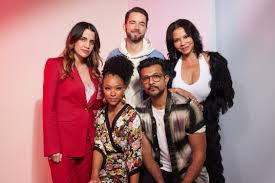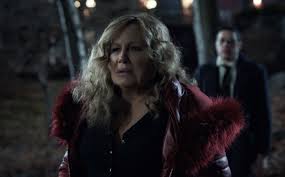We Will Dance Again 2024 Movie Review
We Will Dance Again takes you right there into the Nova Festival. The festival-goers could be your friend, your brother or sister, your son or daughter. It is visceral, it is raw and heart-rending. Already, there are those who wish to deny that it happened at all. For this reason, for those who can steel themselves, it is a must-see.
I approached this documentary with trepidation. I had already seen footage and imagery that had been captured from the Nova Festival, including much of what had been recorded by Hamas’ attackers on the day.
What this documentary brings is the very personal, raw, and visceral experience of the festival goers. We are taken into the lives of several festival goers, we learn of their friendships, their loves, how they came to hear of the festival, how some had not told their parents as the festival began on a Shabbat.
Upon arriving, one or two noted that they could see the Gaza security fence which unsettled them a little, but quickly put these concerns aside as they either put their faith in the organizers’ threat assessments or hadn’t heard or could recall any breaches of the fence in a long while.
Much has been made of the intelligence available to the authorities that a potential attack was coming. Rehearsals had been observed for many months. But the idea of an attack on this scale just seemed a fantasy. The producers of Fauda, a popular counter-terrorism drama, even considered an attack like this as a potential scenario for an upcoming season but quickly discarded it for being implausible.
It’s easy to be critical and smug in hindsight.
The first warning of trouble comes when the first rockets are launched at dawn. Even though, we know what will happen, we agonize with the festival-goers as they try to understand what is going on.Just like in the Christchurch Earthquake when everyone was asked to go home rather than stay at school or work, traffic congestion quickly blocked the exit routes off-site. Many sat around while they waited for the traffic jam to clear.
Meanwhile, those who thought they were fortunate to be the first to drive away and avoid the traffic jam back at the festival site, started encountering terrorists both from the north and the south of north-south running highway. There was now no way to drive out without encountering terrorists.
Terrorists start arriving on the festival site and the sound of automatic gunfire is the first sign that evil had arrived. And it became clear that they were in deadly danger.
Many began recording on their phones, as if realizing that they may not survive this and wanted to leave something behind.
We are taken inside the migunit or rocket shelters packed with festival-goers. At first, an Arab farm worker, also sheltering from the rockets, goes out to talk the terrorists around, he is brutally beaten and executed. The festival goers are forced to throw out grenades thrown into the shelter by the terrorists. Horror, there is no where to go!
We are running alongside them as they flee through trees, and shrubbery only to find that they are now faced with vast open spaces where there is no cover, yet the terrorists can be heard pursuing them from behind. Run!
We sense their loss as friends fall beside them as they run, but there is no time to stop and provide assistance. Run! We hear a young man, who has taken a woman under his protection and though she feels she cannot run anymore, she stumbles, he supports her, he speaks words of strength and encouragement. Run!We follow a mother and her child who have hidden themselves inside a freezer cabinet within one of the food stalls. She can hear the killing go on around her. Be quiet! But there is only so much air in the freezer…
Others who have not run far, decide to hide in a rubbish skip. Unfortunately they are discovered and the terrorists open fire. She hears her partner struggle to breath, she is hit herself. She knows she cannot call out. Be quiet! Some hide under shrubs, bushes, and ditches. Their calls to emergency services are met with incredulity, their stress makes it hard for them to give the details needed for first responders to locate them.
There is a scene that etches deeply in my mind. Two girls run as a terrorist pursues them on the road. They turn the corner but the terrorist catches up with them and one girl falls as she is shot from behind. The other girl can run no more, is made to kneel and she is executed by the terrorist standing in front of her. He sharply turns around to find more to kill. The scene evokes an image of an Eisantzgruppen killer standing in front of a woman, taking aim with his Mauser rifle at a Jewish woman standing before him at point-blank range. Ugh.
Hours later emergency responders and security forces reached the festival site and the survivors began to emerge, to discover the enormity and horror of what had happened. There is a profound scene where a survivor who was in the rubbish skip, shares about the loss of her partner, though despite her best efforts to maintain her composure tears begin flowing down her cheeks, and then we are shocked as the camera pans out to reveal she is in a wheelchair, unable to walk.
This was the world premier for this documentary, it is an Oscar-qualified film festival and if the documentary wins a prize, it is eligible for consideration for the Academy Awards.Because it is the world premiere, we were privileged to meet Yariv Mozer, the award-winning filmmaker who made himself available for questions and answers after each screening.
Mozer is an Israeli film producer, screenwriter, and film director. He teaches at the Steve Tisch Film School at Tel Aviv University. He is best known for his documentaries, Ben-Gurion, Epilogue; The Devil’s Confession: The Lost Eichmann Tapes.Mozer approached MGM Television almost the day after and they quickly agreed to support the project. Other partners soon joined the project including the BBC, SIPUR, Bitachon 365, and Hot Channel 8.
There had been two documentaries already completed in the eight months about the Nova Festival following October 7, so Mozer chose to take a more personal approach. However, the project was fraught with difficulty. The IDF refused to cooperate as some of the information was militarily sensitive. The footage was also material evidence required for an ongoing criminal investigation and may be required for a future indictment.
Understandably survivors were also suffering from PTSD, and many, understandably, were yet unable to talk about their experiences. For this reason, Mozer says, there will be many more stories to come out over the next months, if not years. Professional psychiatric and psychological support had to be provided before, during and after filming. Various members of the team had to record, examine and select material for the documentary. These experiences were in themselves traumatizing and all also required professional psychiatric and psychological support.
New material was constantly surfacing, and this had to be reviewed too.The documentary hardly touches on the sexual assault aspect of the attack. Though the evidence was there, it was deemed too insensitive to explicitly show.The title We Will Dance Again is inspired by Mia Schem’s tattoo, and suggests that there would be a stronger message of hope but the documentary focuses exclusively on the events of October 7, at one of the partners’ request.This documentary, is raw, visceral and intense. Yet it is paced well, and the story it tells is well organized.
As a young New Zealander, going to Gallipoli was a deeply sobering experience. Visiting Dachau and Auschwitz was even more sobering and unforgettable. We Will Dance Again took me to a deeper level again, because it takes you right there into the Nova Festival. You will come to connect with the people sharing their stories. They could be your friend, your brother or sister, your son or daughter. It is so real, and your heart should bleed. The festival goers are not just statistics. Already, there are those who wish to deny that it happened at all. For this reason, for those who can steel themselves, it is a must-see.
